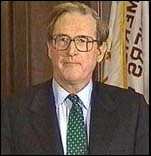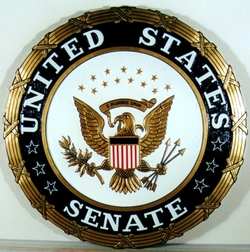"There Are Ways To Do That, And We Will Find Those Ways"
 Two US Senators openly
threatened the general aviation community Thursday, stating if
GA pilots refuse to accept a blanket user fee for pilots of turbine
aircraft filing an IFR flight plan... there will be
consequences.
Two US Senators openly
threatened the general aviation community Thursday, stating if
GA pilots refuse to accept a blanket user fee for pilots of turbine
aircraft filing an IFR flight plan... there will be
consequences.
"Commercial airline passengers shouldn't continue to subsidize
corporate jets," said aviation subcommittee Chairman John D.
Rockefeller (right)during Thursday's Senate Finance Committee
hearing. "If we don't restore equity, then as chairman of this
aviation subcommittee, I will address the equity issue by looking
for ways to limit general aviation access to congested
airspace."
"There are ways to do that, and we will find those ways," the
West Virginia democrat added ominously.
Mississppi Senator Trent Lott joined his colleague across the
aisle in threatening general aviation, if the Senate's FAA funding
bill (S.1300) is changed or disapproved.
"We're going to have a fair bill or no bill, and I'm prepared to
go to the mat," the Republican said.
As ANN reported, the two
senators introduced the Senate's proposed funding plan for FAA
reauthorization in May. The plan would phase out a 4.3 cent per
gallon tax airlines pay for fuel, and introduces a new per-trip fee
for turbine general aviation pilots who fly under IFR flight plans,
with limited exceptions for medical flights and other emergency
operations.
Rockefeller and Lott say their plan restores 'fairness' to
funding the FAA. But that can be in the eyes of the beholder, notes
the Aircraft Owners and Pilots Association -- and several other
senators maintain airlines already receive sizable breaks.

"We've had preferential tax treatment for the airlines,
particularly in pensions," notes Kansas Senator Pat Roberts.
And, Roberts notes, there are also more equitable ways to insure
all users of the nation's air traffic control system pay their fair
share. "The general aviation community is not unreceptive to an
increase in the gas tax," said Roberts. "They're for modernization
as well."
Rockefeller sneers at those opposed to the $25 IFR fee, saying
it "isn't exactly a backbreaker," and that "90 percent of general
aviation aircraft are excluded" from paying.
"It's not the fee, it is the structure," Senator Roberts
replies. "All of general aviation is opposed to the fee, even the
90 percent that are exempt."
 Plus, Roberts adds, "I don't
think that giving the airlines a tax break is the best way to start
modernization."
Plus, Roberts adds, "I don't
think that giving the airlines a tax break is the best way to start
modernization."
Eliminating the fuel tax for airlines also struck New Mexico
Senator Jeff Bingaman a bit oddly. Given all the FAA is hoping to
accomplish with its proposed Next Generation Air Traffic Control
System, "why would you eliminate the fuel tax on the airlines?" he
asked.
Bingaman also pointed out the ATC user fee would likely
discourage flights to smaller communities. Witness Gerald
Dillingham of the Government Accountability Office agreed, noting
that regional air carrier profits are so slim that "the $25 fee
could put them over the edge."
Dillingham restated his contention from previous hearings,
saying that the current excise tax-based funding system "could
support all FAA activities, including NextGen." He added forecasted
revenues to the aviation trust fund could support increased FAA
spending.
Peter R. Orszag, director of the Congressional Budget Office,
said that with a forecast 7 percent annual growth in aviation tax
revenues, the trust fund would bring in some $158 billion over the
next 10 years, versus an inflation-adjusted FAA budget baseline of
$135 billion.
Even FAA Administrator Marion Blakey -- one of the most vocal
advocates for user fees, alongside Air Transport Association
president James May -- came close to admitting the FAA takes in
enough money already, reports the Aircraft Owners and Pilots
Association.
"We [the FAA] don't feel starved for funds," Blakey responded,
to a question posed by New York Senator Charles Schumer during
Thursday's hearing.
 "I can't begin to tell you
how strongly Sen. Rockefeller feels about the $25 ATC modernization
surcharge or user fee," said AOPA President Phil Boyer. "And we
have tried to explain to him how dead set we are against any user
fee on any segment of aviation, regardless of the amount.
"I can't begin to tell you
how strongly Sen. Rockefeller feels about the $25 ATC modernization
surcharge or user fee," said AOPA President Phil Boyer. "And we
have tried to explain to him how dead set we are against any user
fee on any segment of aviation, regardless of the amount.
"But general aviation is willing to contribute more toward
system modernization through the fuel. That's why we have endorsed
H.R.2881, the House FAA funding bill. We would ask the Senate to
give fair consideration to the taxing and funding concepts in that
bill."
The funding authority for the FAA and the government's ability
to collect aviation taxes will expire at the end of September. If
an FAA funding bill (called a "reauthorization bill") is not
approved before then, the FAA could be forced to stop
operations.
 Aero-News: Quote of the Day (10.27.25)
Aero-News: Quote of the Day (10.27.25) ANN's Daily Aero-Linx (10.27.25)
ANN's Daily Aero-Linx (10.27.25) NTSB Prelim: Lancair 320
NTSB Prelim: Lancair 320 Airborne Programming Continues Serving SportAv With 'Airborne-Affordable Flyers'
Airborne Programming Continues Serving SportAv With 'Airborne-Affordable Flyers' Airborne-Flight Training 10.23.25: PanAm Back?, Spirit Cuts, Affordable Expo
Airborne-Flight Training 10.23.25: PanAm Back?, Spirit Cuts, Affordable Expo






